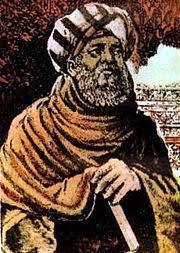 Central Library : Jl. Raya Tlogomas No 246 Malang
Central Library : Jl. Raya Tlogomas No 246 Malang infopus@umm.ac.id
infopus@umm.ac.id

Many Islamic scholars have contributed to the development of science and technology so that humans experience progress in their civilization. However, much of his contribution or work is not known by the world community, especially Muslims themselves, let alone the current next generation. And that raises the question of why so many scholars from the Islamic world have buried their stories and works.
The world's recognition of scientists from the western world such as Alexander Graham Bell, Thomas Edison, James Watt and I'm sure there are many more will make the western world the originator and mecca of science, while Muslims are only followers and connoisseurs. We will share information about Muslim figures recorded in history, one of them is Thabit bin Qurrah.
Life History of Thabit bin qurrah
Abu'l Hasan Tsabit bin Qurra' bin Marwan al-Sabi al-Harrani or better known as Tsabit bin Qurrah is a Muslim figure in the field of astronomer, mathematician and mechanic from Arabia, born in Mesopotamia (Turkey) in 836 AD and died in Iraq, Baghdad February 18, 901 M. Thabit studied at Baitul Hikmah in Baghdad at the invitation of Muhammad ibn Musa ibn Shakir. He once worked at the Astronomical Research Center founded by Caliph al-Ma'mun in Baghdad, and he researched the movements of a number of stars called Hizzatul I'tidalain, which affect the occurrence of earth waves once every 26 years. Thabit also led a study during the reign of Caliph al-Rashid by carefully measuring the area of the earth using longitude and latitude. This discovery inspired sailors, like Columbus, to make voyages around the world starting from the Atlantic Ocean. Thanks to this discovery, the sailors could ensure they would not get lost and return to their original place. Another important invention is the sundial, this clock uses the sun's rays to determine the cycle of time and determine the time of prayer. Thabit also made an annual calendar based on the solar system. Thabit bin Qurrah mastered three languages, namely: Syriac, Arabic and Greek.
The works of Thabit bin Qurrah
Thabit bin Qurrah has contributed a lot to the progress of civilization in the Islamic world through science in several fields that have been studied with various results of his work. In the field of astronomy, among others:
• Mukhtasar fi Ilmin Nujum (Summary of Astronomy)
• Kitab fi Thabai`il Kawakib wa Ta`tsiriha (Book about the character of the stars and their influence)
• Kitab fi Ibhthail Harakah fil Falakil Buruj (a book about the movement of stars and galaxies)
• Kitab fi Tarkibil Aflak (Book about the arrangement of stars)
• Kitab fi Harakatil Falak (Book about the movement of the stars)
In mathematics, Thabit bin Qurrah played an important role in extending traditional geometric concepts to geometric algebra, and some of his theories led to the development of non-Euclidean geometry, spherical trigonometry, integrals, and real numbers. He applied certain aspects of arithmetic to geometric quantities and studied conic sections, especially parabolas and ellipses. Many of his calculations aimed at determining the surfaces and volumes of various types of objects were actually developed processes of integral calculus.
In the field of Mechanics and Physics Tsabit Bin Qurrah can be recognized as the founder of statics, he examines the balance conditions of bodies, beams, and levers.
Apart from being the astronomer, mathematician, and mechanic, Thābit bin Qurrah is also known as a linguist for his works, namely translating Greek mathematical texts (Euclid, Archimedes, Apollonius of Perga, and Ptolemy) into Arabic. He also summarized the work of the physicians Galen of Pergamum and Hippocrates and the philosophy of Aristotle. Thabit bin Qurrah also wrote original works on geometry, statistics, number theory, music, astronomy, medicine, and philosophy.
(source: surau.co, wikipidia, biography.kamikamu.co.id, image: Blog Penemu)